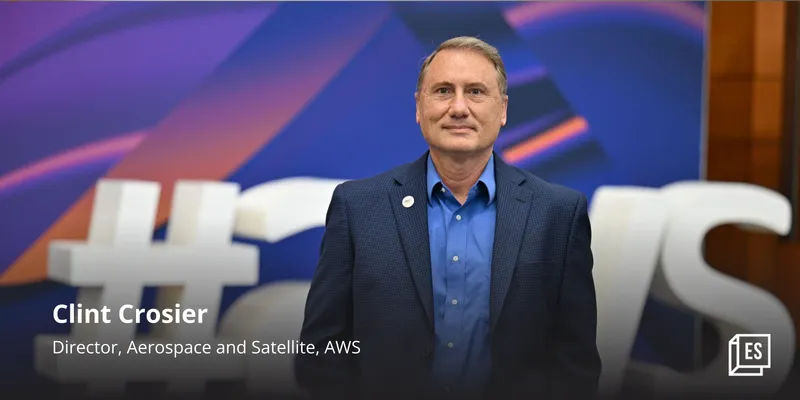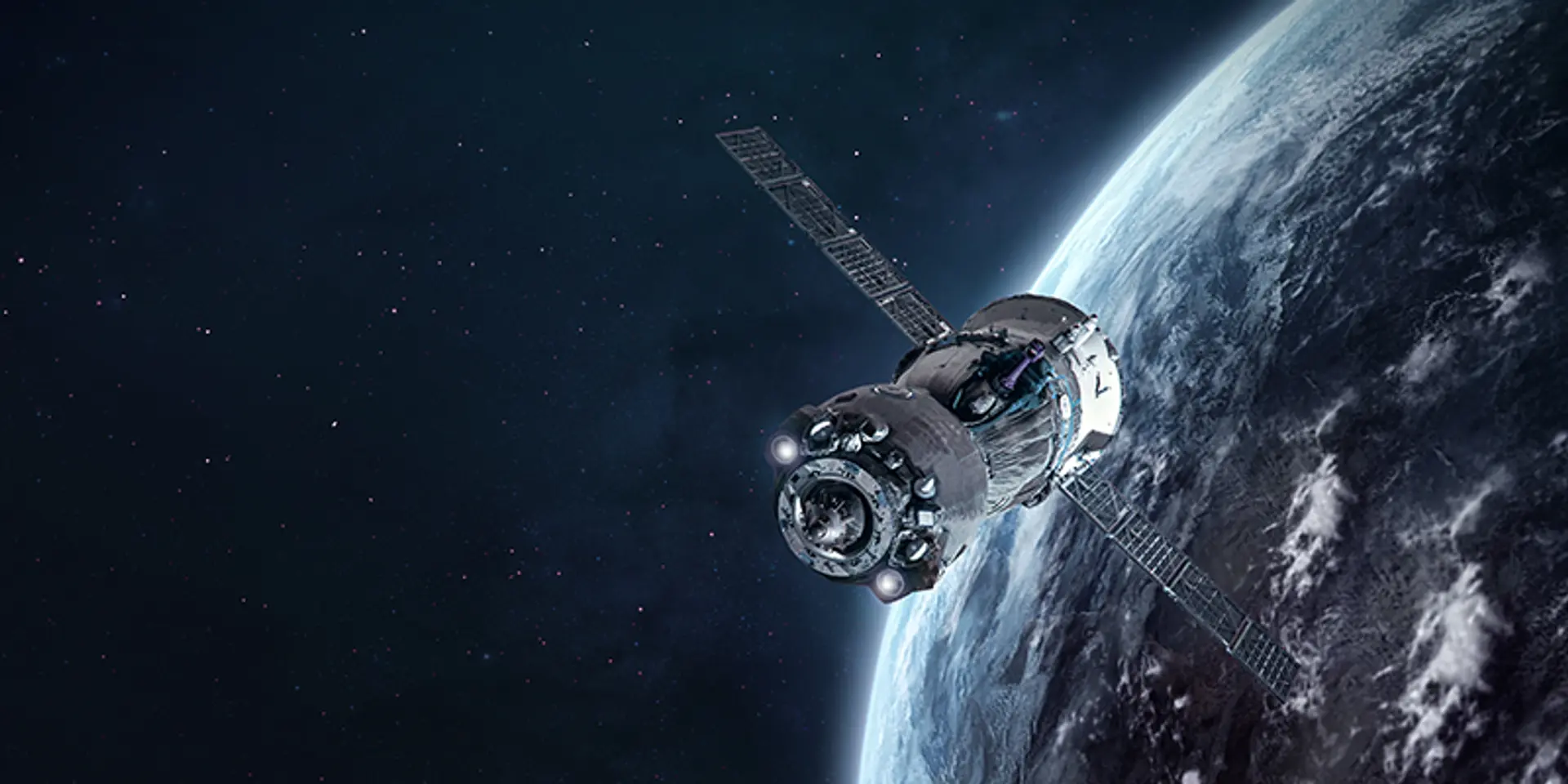In for the long haul: Why AWS is betting on the Indian space economy
Amazon Web Services (AWS) aims to be a key enabler for the growth of Indian spacetech startups. As a sign of its commitment, the company has launched a country-specific accelerator programme.
The global space economy is heating up, with the market poised to grow from $630 billion in 2023 to $1.8 trillion by 2035, according to a report by the World Economic Forum and McKinsey.
India is among the frontrunners of this space race: the market is expected to reach $44 billion by 2033 from $8.33 billion last year.
To maintain this momentum, India will need its government, large technology companies and startups to come together. While the government brings necessary policies and large companies provide the infrastructure, startups add nimbleness to the ecosystem to turbocharge innovation.
Amazon Web Services (AWS) is a keen observer of the spacetech trends, especially in India. The company recently launched a country-specific accelerator programme—AWS Space Accelerator: India—for local spacetech startups.
According to the government, India just had one spacetech startup in 2014, a number that reached 189 in 2023. Last year, total investments in spacetech startups touched $124.7 million.
Indian government’s push in the space sector and the rising number of startups have nudged AWS to make long-term commitments in the country.
In an interview with Enterprise Story, Clint Crosier, Director - Aerospace and Satellite Business, AWS said, “It was clear to us that India was the right place to do it (accelerator programme) as it had the most conditions for the highest success.”
Edited excerpts:
Enterprise Story (ES): How was AWS’ engagement with the Indian space sector, especially the startups?
Clint Crosier (CC): It has been very exciting. Even when we created the space business at AWS some four years ago, we recognised the value of startups and innovation. We have always leaned into startups and companies because we see some of the most exciting innovations coming out of the startups.
We held three global accelerators in those first three years, and those were good and valuable. I started seeing so many growth opportunities in India and determined for the first time to run a space accelerator focused on a single country. And it was clear that India was the right place because of all those external factors we were seeing.

The global accelerator we ran it for four weeks but this (India) we ran it for 14 weeks, focused specifically on the needs of the Indian space market.
Although we see strong technical signals in India, the market is still relatively immature. I mean, it's still learning how to become a powerhouse ecosystem with supply chains and financial investments.
ES: From an AWS perspective what are some of the unique characteristics of Indian spacetech startups?
CC: It was everything across the board. I will just share a couple of companies with you. So, there's one company called Pramatra Space which is building satellites to do quantum key distribution.
As we think about improving business security throughout India and the world, quantum key distribution allows you to do real time key distribution. This is a really novel idea to do quantum key distribution from space.
Similarly, there is another company Inbound Aerospace which is looking at manufacturing in space. There are things you can do like advanced pharmaceutical development in microgravity, with a higher purity and more efficiency than you can do in the gravity of the earth. They want to build a platform in space where they can build enhanced pharmaceuticals. The list goes on.
These things are game-changing.
We had four criteria while selecting the startups: interesting technology ideas, addressing most pressing gaps in the space industry, creating value and how these can be solved by advanced cloud-based technology.
ES: Why the big bet on India?
CC: AWS has been vocal and public that we are investing in India for the long term. IN-SPACe (Indian National Space Promotion and Authorisation Centre) has set a decadal goal through their space policy where they want to grow the share from 2% of the global space economy to 8% of the global space economy within 10 years. That would be a $44 billion global impact from India to the global space industry.
So, when you've got a government that's really creating policy and infrastructure, and you've got AWS saying we want we believe India is a growth engine. We have got a partnership with ISRO (Indian Space Research Organisation) and the right conditions from the government. So, this is where I need to be putting additional focus on the space side and it just became a natural thing for us to do.
ES: How does AWS help these spacetech startups?
CC: We want to create a long-term partnership. AWS will teach them how to be competitive. If these companies are looking at taking a share of the world space economy, then you have to have the most innovative technology and also be cost-effective.
We held a number of seminars helping them understand how to use advanced data analytics to improve the performance of your mission over and above what competitors might be doing. How do you use advanced data analytics, artificial intelligence and machine learning to speed the processing time to draw business insights from your data.
We did several sessions on generative AI (GenAI) on how one could apply it to the rocket launch mission, geospatial analytics, or orbit manufacturing. We are teaching these companies how to leverage all these advanced technologies so that they can not only build but grow and scale their mission successfully over time.
Today, one talks about the Internet of Things here on the planet where everything is connected. In my view, we need to start thinking and talking about the Internet of space things.
Concepts like asteroid mining, lunar exploration, in-orbit manufacturing or servicing, space tourism aren't going to be fully achieved until we get a global connected infrastructure in space. We are going to see some of these things come to fruition in the next 5 to 10 years which is really exciting.
ES: What is your message to budding entrepreneurs in this space?
CC: Space is cool. So there's an exciting and passionate work opportunity for the rest of your life. One of the reasons we have targeted startups is because we see some of the greatest innovations come from these companies.
Also, we have found that it's a lot easier for a company to grow successful by being cloud-native which increases collaboration and partnership.
ES: What are the future plans of AWS in India with regard to spacetech startups?
CC: In this entire accelerator journey, we have assigned mentors, account managers, solution architects and account team. So, essentially these startups have got a team from AWS who are going to be through the lifetime of their growth. This is really important for success, we don't just graduate them and send them out the door. Also we bring all these companies on a single platform which leads to increased collaboration.
ES: What kind of role will GenAI play for the spacetech startups?
CC: We are at very early stages with GenAI and had a number of seminars for the startups. They are in the process of digesting all of this. We will have to review after about six months and look at how they are going to leverage GenAI for their mission systems.
I have always been saying the cloud is the single most transformational technology and it will be the same in the case of GenAI. This will generate wholly new thoughts and ideas that we've never thought of before.
Edited by Affirunisa Kankudti






